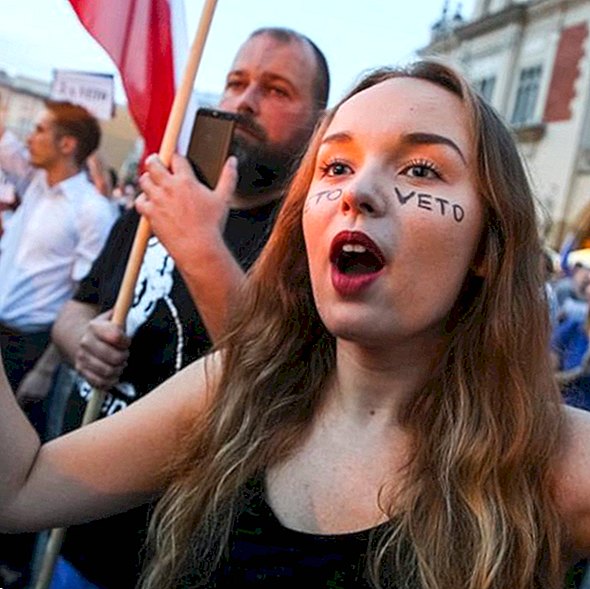Poland on the verge: Young people fear for their land

The veto of the president? what is it all about?
With his veto, Polish President Andrzej Duda has laid a surprise egg that, while not tasting Poland's national-conservative government, is all the sweeter on the tongue of supporters of democratic principles.
Duda has thus blocked two out of three laws with which the ruling party PiS wants to reform the Polish justice system. The only law that Duda gave his go entitles the Minister of Justice - de facto the government - to appoint and dismiss the chairmen of the ordinary courts. The President has prevented that the Minister also controls the staffing in the National Judicial Council and in the Supreme Court.
Regardless of the need for reform of the Polish judiciary, it is difficult to deny that the laws presented by the PiS are anti-democratic. For if the government alone can appoint and dismiss judges and court presidents, the separation of powers (judiciary, executive and legislative) is abolished, since the executive (government) controls the judiciary (legal system).
Since the Supreme Court, among other things, is responsible for monitoring the elections, you would get bellyache at the latest at the next absolute majority for the PiS, the entire reform would go into effect. In addition, considering that a few months ago the government changed the media law so that you have to apply for a chief public prosecutor, you can only say that the Polish government is already gathering a tremendous amount of power.

On the posters of the protest movement Demokracja Illustrowna stands only one word: Konstytuca - Constitution. Colored are the syllables ty and yes - you and me. The movement refers to the Polish constitution, which contains the principle of separation of powers and is intended to protect the population - you and me.
© demokracjailustrowana.plThe protests: a summer for democracy
Since the EU sees itself as a democratic confederation of states, it does not like to see one of its members say goodbye to the agreed basic values bit by bit. Therefore, it has initiated infringement proceedings because of the signed law and, if the judicial reform comes into force, it should threaten the Polish government with even the highest of all sanctions.
And at the latest there (in truth, but also earlier) the fun seems to stop, especially for the younger part of the Polish population? Young Poles are not in the mood for stress with the EU. As a result, in the middle of July, Poland experienced protest movements that have not existed in the country since the 1980s. And they have actually made a difference - probably even more than the threats of the EU. In any case, President Duda has said after his veto that the judiciary reform must now be changed so that "society and state are not split." The Poles have thus saved their democracy at least over the summer.
Voices: How are young Poles facing reform, protests and veto?
CONTRA: Julia Szyndzielorz (30), a freelance journalist from Warsaw

Julia Szyndzielorz
© Filip Skro? C
"I have never experienced such a mood in Poland, young people are watching parliamentary sessions on their smartphones, actresses are publicly reading our constitution, people from liberal circles, who never used to sing, are singing the Polish national anthem where all these people were during the election.
Especially the younger Poles, who grew up with freedom and democracy, have understood through the planned reform of the judiciary that these values are not self-evident. The interesting thing is that the reform plans and protests have brought together two different sections of the population: the judges, who initially feared only for their power, and all the young people who are fighting for freedom above all else. By seeing the judges see people standing up for them, they are now ready for reforms that would improve Poland's judicial system and strengthen democracy.
The only question is whether the President is really serious about working with them on a future reform. However, it is already nice to see what peaceful protest can do. "
PRO: Patrick Kopec, 28, student with German and Polish nationality, currently lives in Trondheim

Patrick Kopec
© private"I think that the reform of the judiciary is basically a very good reform, the core idea being the complete decommunization (" decomicizacja ") of the Polish judiciary, finally a government dares to solve this important problem of Polish democracy.
I support such ideas in Polish politics with full force, therefore, the reform is, in my opinion, a skilled move against the old, supposed 'elites' of the Polish judiciary.
Unfortunately, the current Conservative government has consistently bad and slanderous press in foreign media, especially in Germany, so I was clear before the protests, which negative reporting would receive the as positive to be assessed reform. In no case should foreign media put such pressure on the Polish government. Legal protests should definitely be considered, but not defamatory voices from foreign media, which are usually very ill-informed and biased.
The veto of President Duda is a skilful move to wipe the eyes of the protesters. The mood will calm down, and the reform will take effect in a slightly different way anyway in a few weeks anyway? on a transparent, democratic and legal path. "










